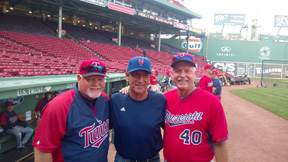July 16, 2014

Courtesy
By Jess Thomas
The average Stow resident likely can’t say they have defeated former baseball great Roger Clemens and struck out 12-time All-Star Wade Boggs four times in a game.
But Stow’s Paul Cacciatore did both of these in a 10-year minor league baseball career.
“It was something that you can’t really imagine unless you do it,” Cacciatore remarked. “It’s a whole different world. It’s like a fantasy world.”
Cacciatore played for the minor league affiliates of the New York Mets, Houston Astros, San Diego Padres and Pittsburgh Pirates from 1975-1984.
Growing up in Waltham, MA, Cacciatore spent his youth playing with older kids and blowing away the competition, leading up to his junior and senior year for Waltham High where over 10 scouts watched him pitch every game.
Cacciatore was pitching on the day of the June draft of 1975, when his manager visited the mound amidst pure pitching excellence.
He recalled his manager telling him, “I’ve got to take you out of the game.” When Cacciatore questioned the decision, he was told, “You just got drafted by the New York Mets.”
At only 17 years old, this was a dream come true for Cacciatore, who knew from a very young age that he had the talent to be a professional baseball player.
He was already pitching 85 miles per hour at age 14 and had reached 95 as a high school senior. He was playing with 12-year-olds when he was only eight.
Being so young when he was drafted, Cacciatore joined the Mets rookie league team, petrified and alone. He was smaller than the average player and his manager even mistook him for a batboy.
After the team realized that Cacciatore was a pitcher, he was asked to pitch to the number one draft pick to show what he was made of. He remembered the batter saying, “Alright little man, let me see what you got.”
Cacciatore said, “The first pitch I threw, I swear to God it was 100 miles an hour.” After 20 pitches of domination, coaches swarmed Cacciatore and the team introduced themselves, and from that day on, his life completely changed; he was ready to play.
He spent most of his time in single A and double A, with a few trips to triple A for New York and Houston.
In the prime of his career from 1977-79, Cacciatore posted a 29-21 record with a 3.84 ERA and 20 complete games (three shutouts) for single and double A with the Mets.
By 1981, he had really proven himself and was invited to major league camp as a non-roster invitee with the Houston Astros, a team to which he was traded in 1980.
He said that he caught their eye with his outstanding pitching and he was told there was 80 percent chance that he would be going to the major leagues.
“Probably about three days later, I was throwing at batting practice and I tore my rotator cuff,” Cacciatore lamented.
This required surgery from famous surgeon, Dr. James Andrews, and derailed any hopes of Cacciatore reaching the majors. He was still given more chances in the minors, but his arm would sometimes hurt and he lost some juice on his fastball, dropping to around 90 MPH.
He defeated Clemens when the 354-game winner was with the Boston Red Sox’s double A affiliate in 1983. It was Clemens’ only loss that year. In addition to Boggs, Cacciatore also pitched against, and struck out, Hall of Famer Cal Ripken, Jr.
Cacciatore was also a teammate of now-Minnesota Twins manager and pitching Coach Ron Gardenhire and Rick Anderson, whom he got to see for the first time in 35 years at Fenway Park a few weeks back.
His arm forced him to retire in 1984 when he was 27 years old.
Cacciatore accumulated many entertaining stories over his career, with one coming from a game in Colombia during winter baseball where he was pelted by apples and bottles of Vodka in response to him giving up eight runs.
“These people bet on the games and they bet their last money, whatever money they have. You’ve got to be kidding me,” Cacciatore exclaimed.
He was getting heckled by Colombian fans that were losing money because of how he pitched. He remarked that pitching for four months in a third world country was crazy.
Retiring from the game was quite the shock for Cacciatore. He remembered thinking, “I have to join the real world. I’m with the rest of the common folk now.”
How quickly everything changes when a sports career ends. His life was altered when he met his wife Karen and raised three boys. He managed to find odd jobs over the years while umpiring and refereeing baseball and football: the logical thing to do for an ex-athlete.
Cacciatore moved to Stow in 1994 after visiting his wife’s sister on weekends for a while and deciding it was a great place to live.
He looks fondly back on his playing days and despite still feeling shoulder pain, Cacciatore acknowledges that he has lived a great life.
“I’d do it all over again,” Cacciatore said. “There’s nothing like putting a uniform on and getting paid to do it.”